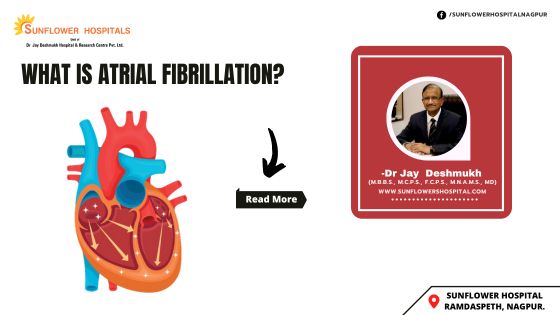What is the risk of stroke in people who have this arrhythmia?
About 15 to 20% of people who have this irregular heart rhythm get brain strokes. The risk increases if you have diabetes, hypertension, heart failure, or a previous stroke. Women are at a higher risk. Pooling of blood in the atria due to the irregular beating of the upper chambers of the heart and poor pumping activity of the atria causes stagnation of blood in the upper chambers leading to clot formation. This clot can easily be pumped out to the brain, causing a brain stroke.
Do individuals with atrial fibrillation require blood thinners or anti-clotting medications?
Certainly, they do require them on a lifelong basis. These medications prevent the clotting of blood in the upper chambers of the heart and thus prevent brain strokes.
What are the symptoms of atrial fibrillation?
Few individuals may not have any symptoms. Few may experience fast pounding of the heart, palpitations, chest pain, and fatigue. Few may have shortness of breath, weakness, decreased stamina, and dizziness.
What are the common causes of atrial fibrillation?
Coronary artery disease, hypertension, sleep apnoea, and valvular heart disease are common. Previous heart attacks, lung diseases including cor pulmonary, and thyroid disease, tobacco, alcohol, and excess caffeine are other causes Certain viral infections of the heart like myocarditis can cause atrial fibrillation. Some may have no predisposing cause. Increasing age and obesity are important predisposing factors.
What are the basic lifestyle changes that can reduce the chances of atrial fibrillation?
Avoiding or limiting alcohol and caffeine, avoiding smoking, getting regular exercise and maintaining a healthy weight, having a healthy diet, and stress management are important aspects to reduce the chances of atrial fibrillation…..J, J, Je-J.J. Over 12 million people have atrial fibrillation. This is due to the fast and irregular beating of the upper chambers of the heart. Untreated atrial fibrillation, also known as Afib doubles the risk of heart-related deaths and a five-fold increase in the risk of stroke or paralysis. Yet, many people are unaware that Afib is a serious condition.
What are the tests done to reach a diagnosis of atrial fibrillation?
Clinical examination of the pulse and hearing irregular heartbeats can diagnose atrial fibrillation. However, ECG is the most important test to diagnose atrial fibrillation. Blood tests, Holder monitoring, event recorder, echocardiogram, Chest x-ray, and stress ECG are other important tests.
Can atrial fibrillation be cured permanently?
If one manages the pre-disposing factors like thyroid disease or sleep apnoea, then there is a possibility of a cure. Radiofrequency ablation of abnormal hyperactive electric foci in the atria may help, though this is a difficult procedure and requires expertise in the field.
What are some medications required to manage atrial fibrillation?
Some medications to restore normal rhythm include Flecainide, Propafenone, Quinidine, Am Io drone, Dofetilide, and Sotalol. Beta-blockers Diltiazem and Verapamil are used.
What are the common blood thinners that are used to prevent stroke in individuals with atrial fibrillation?
They do prevent blood clot formation and reduce the risk of stroke. However, they may increase the risk of bleeding and hence need to be used judiciously. They include Warfarin, Aspirin, Heparin, Apixaban, Dabigatran, and others. Atrial fibrillation is the commonest arrhythmia in the elderly. It needs to be treated in all individuals to prevent further deterioration in heart function and a major possibility of brain stroke.
Author: Dr Jay Deshmukh
Dr Jay Deshmukh is Chief Physician and Director, Sunflower Hospital, Nagpur Honorary Physician to Honorable Governor of Maharashtra and PondicherryCentral. Dr Jay Deshmukh is an M.B.B.S., M.C.P.S., F.C.P.S., M.N.A.M.S., MD From Internal Medicine – Bombay and New Delhi.


